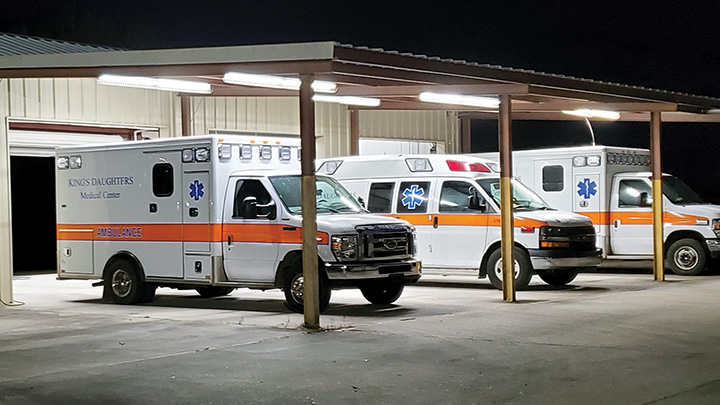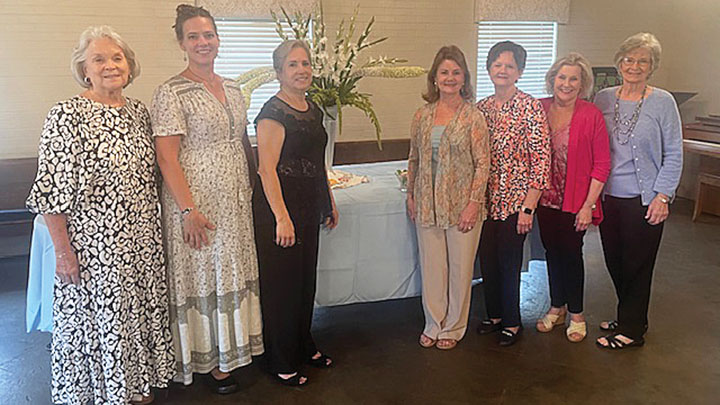Medicaid expansion coming to Mississippi?
Published 6:00 pm Tuesday, April 13, 2021

- Daily Leader file photo
A non-profit has filed paperwork to start a ballot initiative to allow Mississippi voters to decide on Medicaid expansion.
Dr. Jeffrey Ross thinks that’s a good idea. Chief Medical Officer of King’s Daughters Medical Center in Brookhaven, Ross said it would be a benefit to both the state government and its citizens. KDMC CEO Alvin Hoover agrees. Hoover explains it as a $10 deal.
“The general Mississippi Medicaid program has been, you put $1 in and you get $3 back plus your dollar,” Hoover said. “In this, you bring a dollar to the table, you’ll get $9 plus your dollar back. That’s a $10 deal.”
Trending
“The monetary piece of this, the cash value, is truly immense. To offer an economic incentive like this in such a difficult time,” he said. “It’s worth $400,000 to $600,000 into the state’s general fund each year. That pays for itself.”
The time has come to take advantage of the federal dollars the government is giving away anyway, the hospital director said, and stop turning away $1 billion each year for what is now the ninth year.
Hoover said too many people make too much to qualify for assistance and not enough to buy insurance. He said he’s excited to take a ballot initiative to the people because “Mississippi has proven to be one of the most generous states in America, even though we’re one of the poorest states.”
But state Representative Becky Currie, also of Brookhaven, says she’s not sure this is the best way to go about it.
Currie said she has mixed feelings about Medicaid expansion — people need healthcare but is this the best way to provide it?
“Is expanding Medicaid good for Mississippi? That is the million dollar question, or billion dollar question,” Currie said.
Trending
With expansion across much of the nation, Currie said she asks herself often if her state is missing out. As a registered nurse, she believes people need to be taken care of, and those who cannot afford healthcare need an option.
“Should they not be taken care of, or do we let them continue to show up at the emergency room when they are deathly sick and the hospital take care of them for free and our medical bills continue to rise? Someone has to pay for it,” she said.
Hospitals spend millions on uncompensated care annually and the politicians have failed to do their jobs and answer the questions for their constituents, Currie said.
Initiative 76 would put Medicaid expansion in the state constitution, draw billions of dollars in federal funding and provide health care to potentially hundreds of thousands of working, low-income and uninsured Mississippi citizens.
The Healthcare for Mississippi nonprofit, which filed the initial paperwork, was incorporated recently by Mississippi Hospital Association president Tim Moore, Hattiesburg pediatrician Dr. John Gaudet and public health executive and advocate Nakeitra Burse.
“Hospitals and our working poor across the state of Mississippi cannot keep waiting,” said Moore. “It’s time to let the Mississippi voters decide.”
Dr. Ross is in agreement.
“I think it’s a good idea, for a long list of reasons,” Ross said. “The first of which is we cannot get our legislative leaders in the state to see reason and go ahead with expansion in the ‘normal’ way. Sometimes you have to take matters into your own hands and see what the people want.”
Mississippi is one of just 12 states that has refused to expand Medicaid, leaving hundreds of thousands of citizens without the ability to afford health care coverage and rejecting at least $1 billion per year in federal funds. The Magnolia State also has some of the greatest healthcare disparity in the nation.
There’s quite a bit of uncompensated and charitable care, Ross said, and although helping everyone is the mission of healthcare providers, there’s a limit to what any small hospital can do.
“Medicaid expansion would save a lot of money for the state of Mississippi and for a lot of people,” Ross said. “It can save a working family a lot of money because insurance is expensive.”
Many health advocates have pushed for Mississippi to expand Medicaid under the federal Affordable Care Act and draw down billions in federal dollars to a state already heavily reliant on federal spending. The COVID-19 pandemic, in particular, has highlighted health care disparities in the state, which is home to one of the highest percentages of uninsured residents in the nation. Congress further incentivized Mississippi to expand Medicaid in its latest stimulus package, upping the federal match to the 12 states that have resisted expansion.
But state GOP leaders, starting with former Gov. Phil Bryant, have opposed the move, saying they don’t want to help expand “Obamacare” and that they don’t trust the federal government to keep footing the bill, eventually leaving state taxpayers on the hook.
Meanwhile, hospitals — especially smaller rural ones — say they are awash in red ink from providing millions of dollars of care each year to uninsured and unhealthy people in Mississippi.
But Ross said looking at Medicaid expansion as making “Obamacare” bigger is a misunderstanding.
“This is in no way expanding the Affordable Care Act, which is not going away,” he said. “This is a way to provide for people who need help.”
Gov. Tate Reeves has repeatedly stated his opposition to expanding Medicaid and fellow Republican House Speaker Philip Gunn has said the same.
“I am not open to Medicaid expansion,” Gunn said. “We cannot afford it, and there are numerous other reasons … Taxpayers cannot afford it.”
But Moore says public polling reveals about 60% of Mississippi voters are in support of expansion efforts, and it’s time to move along an avenue that would allow them to speak.
“Health care shouldn’t be in the constitution,” Moore said. “Neither should medical marijuana. That’s not what it’s for. It should have been taken up and dealt with in the Mississippi Legislature. But they did not do that. They didn’t handle it, and so you have to take the next step and put it before voters.”
The state would pay 10% of the cost — estimates range from about $75 million to more than $150 million a year — and the feds would cover the rest, estimated at $1 billion a year. The Mississippi Hospital Association has pitched a plan to lawmakers that the state share could be paid by taxes on hospitals and fees paid by the new Medicaid enrollees.
But the American Rescue Plan recently passed by Congress would provide further incentives for states that expand Medicaid, dropping the state’s share of the cost further.
“This is a way for us to help take care of people who need it,” Hoover said.
“I have said for years the Legislature needs to sit down and look at different ways we may want to dip our toe in,” Currie said, referencing the Indiana Legislature’s 10-year trial period of expansion as a possible option.
“So now the people have to decided and it will forever be in the Mississippi Constitution where it cannot be changed unless the people vote on it again and politicians can’t change it,” Currie said.
As a legislator, Currie said state lawmakers need to do their job and take a serious look at what’s best for the state.
“Medicaid expansion is not exactly what people think it is and so much education is needed before anyone should make an informed decision. Medicaid is complicated,” Currie said. “It needs to be legislated, not mandated.”
Mississippi Today contributed to this article.





